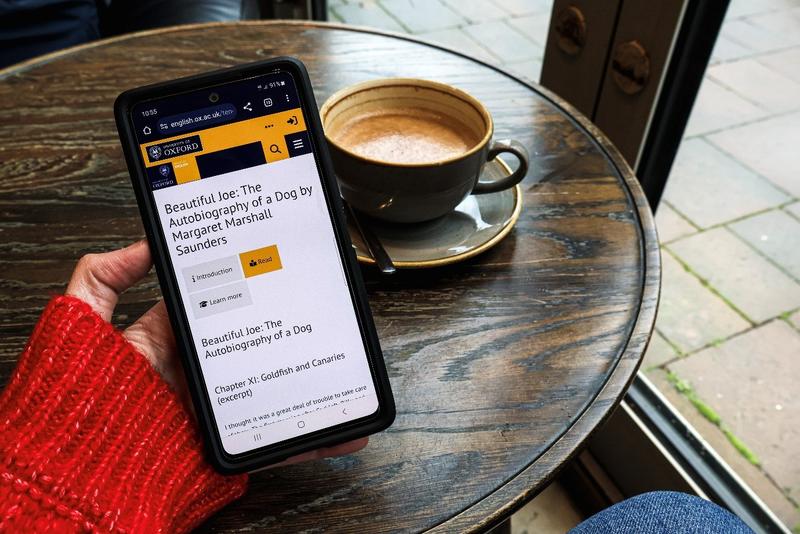How I overcame my reading slump with the Ten-Minute Book Club

I am sitting in a coffee shop on Queen Street with an oat milk latte reading Beautiful Joe: The Autobiography of a Dog by Margaret Marshall Saunders on my phone. Written in 1893, Beautiful Joe is the first book of season 4 of the Ten-Minute Book Club (TMBC) - and the first book I have attempted to read in months.
With so many distractions and barriers to reading, like many of us, I have found it difficult to find the time or energy to pick up a book, let alone finish one. However, in 2020 Oxford English Literature academics Dr Alexandra Paddock, Professor Kirsten Shepherd-Barr and Dr Erica Lombard found a solution to this problem with the creation of TMBC.
Initially founded as a way of grappling with the burnout that many people were experiencing during the pandemic, TMBC aims to help people connect with a range of literature through short-form textual excerpts.
Dr Alexandra Paddock, curator and project director for TMBC said, “What makes Ten-Minute Book Club different is both the ten-minute part and what we mean by book club. We provide the texts and anyone who uses the resources provides the people part of that club. The idea is that they are toolkits for people to adapt in any way they like to any kind of book club experience they want, whether that is reading for yourself, reading with people that you know, using it as a way of connecting in educational contexts, anything you want.”
As its title suggests, TMBC provides you with an excerpt that only takes ten minutes to read, helping to remove those barriers to starting a book which I and so many others have encountered. As Dr Paddock explained: “You don’t have to read the entire text to start engaging with it and that’s part of what we are trying to do with TMBC,” she said. “It is focussed on a page or two of text, but we will guide you in using the book club toolkits in ways that you can interrogate and deepen your reading of that tiny excerpt of the full book.”
Finding myself three months deep in a reading slump with no end in sight, I load the virtual book club on my phone and begin reading.

When first opening the TMBC website, I am presented with a short introduction which provides the context of the book, as well as a brief background of the writer, Margaret Marshall Saunders. The excerpt itself is from Chapter XI of the novel, but it has been chosen in such a way that it doesn’t feel like you are missing anything by not reading the entire text. As Dr Paddock said, “One of the most important things that we do is to have a ten-minute excerpt that gives you a real flavour of the particular literary text.”
Like Beautiful Joe: The Autobiography of a Dog, all of the books in season 4 have been specially curated by Oxford academics and are free to read. “The most important thing for us is that the text is free and accessible – out of copyright and in the public domain,” Dr Paddock said. “We are always trying to showcase and introduce some of the cutting-edge research interests in Oxford’s English Faculty and particularly the teaching that happens here. Very often, the suggestions that we have on the platform have come out of tutorial discussions or newly developed reading lists. If you want an insight into Oxford teaching, and especially how it works as an English student, it’s a great place to go.”
Alongside Margaret Marshall Saunders, other writers featured in season 4 include Thomas Hardy, Ndabaningi Sithole and D.H. Lawrence. “Season 4 has some great texts,” Dr Paddock explained. “It’s a mix of poetry, short stories, novels, autobiography, political manifestos. It is just a really enjoyable set of reading.”
After each excerpt, there is a section of questions and themes to consider, which really helped me to engage with the book in ways I wouldn’t have done if I were to read the text without the toolkit provided by TMBC. For this particular book, English literature expert Dr Lauren Cullen explained how reading about animal cruelty from the perspective of an animal aimed to challenge our understanding of the human-animal relationship – and by extension, what it means to be human.
It is partly because of this toolkit that the TMBC has been so successful and used in a range of settings: from English teachers creating their own ten-minute book clubs in schools to events such as the 50-person book club for the A Level ‘Frankenstein Revisited’ study day last October.

As I come towards the end of the excerpt, I finish the last dregs of my now lukewarm oat latte and click on the Learn More section of the website. Here you can find a number of free resources to learn more about the text – including a link to access the text in full.
I lean back in my chair and click on that link.
Chapter One…
Find out more about Ten-Minute Book Club here.


